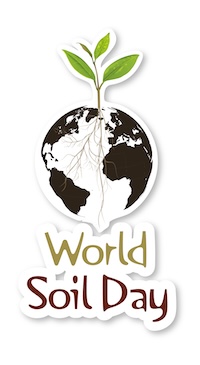No-Till Farmer didn’t stumble upon the idea of soil health just recently – we’ve been writing, promoting and pounding the desk on it for decades now. And more than 10,000 articles, videos, podcasts and conference sessions later, we’re still doing it.
But as World Soil Day is celebrated today, it’s great to see no-till practices and regenerative agriculture continuing to gain momentum globally, and here in the U.S. as well. Today, the nonprofit organization Kiss the Ground will release a mini-documentary, “Stories of Regeneration: North Dakota.”
The organization has followed farmers and lifelong friends, Chris Walberg and Tyler Zimmerman, who are working together to regenerate each other’s land using soil-building practices.
The short film, “displays the power that partnership has on farming, while illustrating the impact that community can have on our food system, and the importance of learning from the past to create a more resilient future,” Kiss the Ground says in a statement.
Walberg manages a 2,000-acre cash grain farm and 3,000 acres of pasture for his cow-calf operation near Leonard, N.D. Zimmerman, who we recently featured in No-Till Farmer – no-tills about 2,500 acres of grain crops in roughly the same area in southeastern North Dakota.
The two farmers have been lifelong friends, but in the last several years they have become closer friends and neighbors and have shared intel and insights in building regenerative practices.

“To have somebody that close, and that trustworthy … it helps drive our journey forward,” Zimmerman says in short preview of the documentary. “We’ve brought back oats, barley, wheat, and we’ve done flax, we’re raising alfalfa, doing sunflowers. We’re just really trying to push the envelope and get that diversity back in the soil that needs to be there.”
Kiss the Ground is an audience-supported nonprofit promoting regeneration and healthy soil as a viable solution to what it deems “the wellness, water and climate crisis.”
Led by CEO Evan Harrison, the Los Angeles-based organization was founded in 2013 and says it has inspired millions to participate in the Regenerative Movement through storytelling, education and partnerships.”
World Soil Day is held annually on Dec. 5 to focus attention on the importance of healthy soil, and to advocate for the sustainable management of soil resources. The United Nations General Assembly designated the first official World Soil Day in 2013.
World Soil Day 2024 (WSD) campaign, under the theme Caring for soils: measure, monitor, manage underscores the importance of accurate soil data and information in understanding soils characteristics and supporting informed decision-making on sustainable soil management for food security.
Soils supply 15 of the 18 naturally occurring chemical elements essential to plants, and up to 58% more food could be produced through sustainable soil management, FAO notes.
Here in the U.S., there are 110 million acres of no-tilled acres, according to the most recent Census of Agriculture -- a far cry from the early 1970s when that was only a few million acres.
According to an article we published in 2022, researchers Amir Kassam, Theodor Friedrich and Rolf Derpsch found the number of conservation agriculture acres worldwide increased by 244.4 million acres to a total of 507.6 million acres between 2009 and 2019.
The U.S. has the highest number of acres (108.8 million), followed by Brazil with 106.2 million acres and Argentina with 81.3 million acres. There is certainly a lot to be proud of in North and South America, as well as Australia (56 million) and Canada (53 million).
What is concerning is two nations with the highest populations, India and China, with extremely high food demand, don’t even make the Top 5 list of countries with no-tilled acres. India has the second most arable land and China comes in fifth.
These totals show that we must do a better job convincing government leaders in some countries to provide substantive incentives and serious educational programs to help move the needle on sustainable farming adoption worldwide. Our food systems depend on it.






